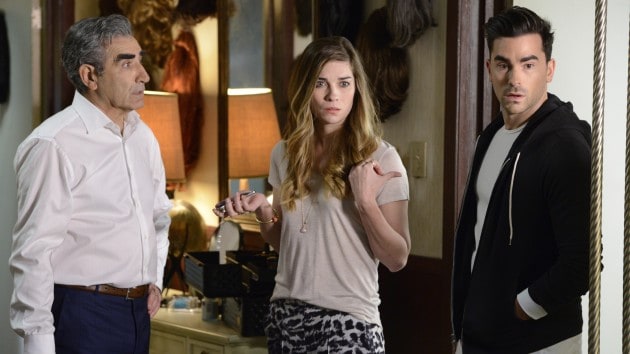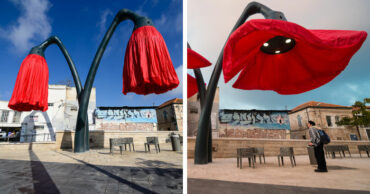
I love how Schitt’s Creek completely undercuts any sense of satisfying resolution in its final moments of each episode, every “happy” ending ultimately a guise for something a bit darker and more ironic. It’s not exactly a unique trait, but it’s still one that distinguishes Schitt’s from the other collection of family comedies on network television – and in “Bad Parents”, makes for a succinct little half-hour about the Rose family dynamic.
Moira and Johnny not knowing their children’s middle names is a horrible thing – yet neither David or Alexis seem to care too much about, which undercuts the drama of the episode’s premise on arrival, and sets the stage for another acerbic episode of cringe comedy. Unlike previous episodes, however, “Bad Parents” is the first time Schitt’s Creek has tried its hand at farce, when Alexis mistakenly thinks Mutt is sleeping with the mayor’s wife (turns out he was just hanging out with his mom, away from the pressures of his father and the mayoral line of the family), leading to an awkward lunch scene with Moira, Johnny, and Jocelyn at the coffee shop.
Now, Alexis thinking Mutt is sleeping with Jocelyn is much funnier than the parents; the latter stuffs in way too many cheap, obvious sex puns to be really be amusing in any way (except when Eugene Levy and Catherine O’Hara are making incredulous faces; those are always priceless): but Alexis and Mutt’s misunderstanding leads to a nice little scene where the two bond over their shared failure in their parent’s eyes, about the cutest moment two people could have while picking up trash during their court-ordered community service. For the first time, it feels like Creek is beginning to build a relationship outside the family, and “Bad Parents” is all the better for it.
Creek has also found comedic gold in the dynamic between David and Stevie, and it’s really that story that elevates “Bad Parents”, and ultimately brings the episode together with a poignancy previous episodes have lacked. After Johnny tells David to take his clothes out of the closet, David enlists Stevie to help him sort through them (by fit, fabric, and nationality) and sell them at the local consignment shop. Honestly, I could just watch the two exchange dumbfounded looks at each other for a half-hour; the chemistry between the actors is terrific, bringing life to otherwise predictable jokes (like David thinking Stevie wanted to hook up in the grossly under-budgeted honeymoon ‘suite’) with their sarcastic exchanges. But “Bad Parents” uses that story to reveal a universal truth about families: no matter how much we sometimes want to get rid of everything that connects us to our parents in our quest for identity, there’s a connection between generations we can never deny – for the Rose family, it’s just a little more prominent, living in hotel rooms separated by an open door. No matter how much we disappoint them or want to get rid of them, they often remain the defining influence in our lives well into adult hood (or extended childhood, in David and Alexis’ case). As Johnny points out later, it’s in the subconscious: he moved those clothes, but he couldn’t get rid of them, that nostalgia for his family and his old life something he continues (like the town around him) to cling onto, probably a bit longer than is healthy.
Anchored by this story, “Bad Parents” isn’t just an episode about how horrible the Rose family can be towards each other – and that slight beating heart at the center is enough to elevate another episode of funny, if incidental, material. Schitt’s Creek certainly has found its comedic rhythms, but “Bad Parents” is the first example of Schitt’s Creek reaching for something a little more meaningful, a much-needed injection of pathos into the show’s overarching narrative.
 Follow Us
Follow Us





